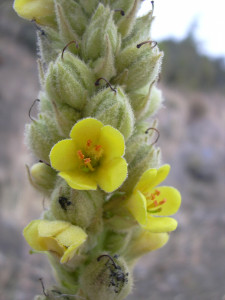Verbascum thapsus (great mullein or common mullein) is a species of mullein native to Europe, northern Africa, and Asia, and introduced in the Americas and Australia.
Contents
Uses
This herb has several medicinal uses
- The flower can be used as an expectorant and for pain relief The leaves of mullein can also be combined and used along with other herbs like thyme and coltsfoot The dried leaves are put into a tobacco pipe and smoked to cure coughs and irritation in the respiratory symptoms
- Mullein tea is used to soothe coughs It can also act as a sedative
- The flowers of this herb are used to treat migraines; these also act as bactericide and antibiotics
- Poultice made with leaves of mullein can heal wounds as well as tumors, piles and ulcers
- The plant juice as well as powder made with the dried roots can remove warts
- When the flowers of mullein are mixed with olive oil, these can cure earache
- Doctors say that mullein has astringent, emollient or soothing properties as well as acts as a demulcent or a calming substance
- These properties in mullein can help treat bleeding in the lungs, in the bowels and can bring relief from symptoms of Tuberculosis
- The sedative and narcotic properties in mullein can cure hemorrhoids, coughs and asthma
- Applied externally, mullein can treat burns, frostbite and bruises It can also be used to treat skin ulcers and skin burns
- Mullein is also believed to treat diarrhea
- Some herbal practitioners believe that mullein syrup can treat coronary disorders such as angina and heart palpitations
- Childhood ailments such as mumps, tonsils, measles, and chicken pox can be treated with mullein
- Mullein is also used to make make-up products such as rouge and dyes
Benefits
Verbascum thapsus as an herb has the following health related properties – expectorant, anti-inflammatory, anti-viral and diuretic. The following are some of the important and popular health related benefits of Verbascum thapsus:
- Upper Respiratory Tract Disorders
Verbascum thapsus as an herb has been approved by the German Commission E for treating cough and bronchitis. Even before getting approved by the Commission E, Verbascum thapsus was used by Native Americans and in folk medicine as an effective treatment for upper respiratory tract disorders including Asthma, tuberculosis, cold, cough, whooping cough, sore throat and other forms of lung diseases.
In folk medicine, the thick and soft leaves of Verbascum thapsus are used to treat respiratory disorders as they relieve chest congestion and clear the lungs. Herbal tea made from Verbascum thapsus leaves is extremely popular in traditional medicine for treating asthma, cough and cold. The Creek Indian tribe has also used the roots of the plant as a decoction for treating cough and some tribes even smoke it to treat asthma. Verbascum thapsus tea has strong anti-inflammatory and anti-viral properties as suggested by few clinical studies.
- Ear Problems
A popular usage of Verbascum thapsus is in treating ear related problems. The herb is used topically to treat problems such as earache, middle ear infection, furuncles and even eczema of the auditory canal. The oil derived by steeping Verbascum thapsus flowers in olive oil help in easing ear pain, reduce inflammation and also can fasten the healing process. However, it must be noted that any form of herbal supplementation must not be used in the ear if there are chances of a ruptured eardrum.
Verbascum thapsus can also be used to treat the following conditions – rheumatism, intestinal pain caused by colic, painful diarrhea, gout etc. It is believed that Verbascum thapsus helps the overall immune system of the body due to its anti-inflammatory effects.
The herb is also used by tribal members to enhance the natural beauty in women. It is said that leaves of the herb can be rubbed to the cheeks to get a natural blush. Even during the ancient Roman times, the flowers of the herb were used as a natural form of hair dye and cloth dye.
Cautions
According to the Natural Medicines Comprehensive Database, reliable safety information on mullein leaf is lacking. But research has found that mullein is toxic in very large doses. Avoid taking it if you’re pregnant or breast-feeding. Consult your doctor before consuming mullein if you’re on any medications or using any other herbs because mullein leaf may have interactions with them.
Interactions
Unknown, please consult with your doctor
Other names
mullein
References
Source: Wikipedia, https://en.wikipedia.org/wiki/Verbascum_thapsus
HomeRemediesForYou, http://www.home-remedies-for-you.com/herbs/mullein-herb.html
LiveStrong, http://www.livestrong.com/article/378894-what-are-the-benefits-of-a-mullein-leaf/
Vitaminsestore, http://www.vitaminsestore.com/mullein-benefits-reviews-side-effects-and-dosage/

